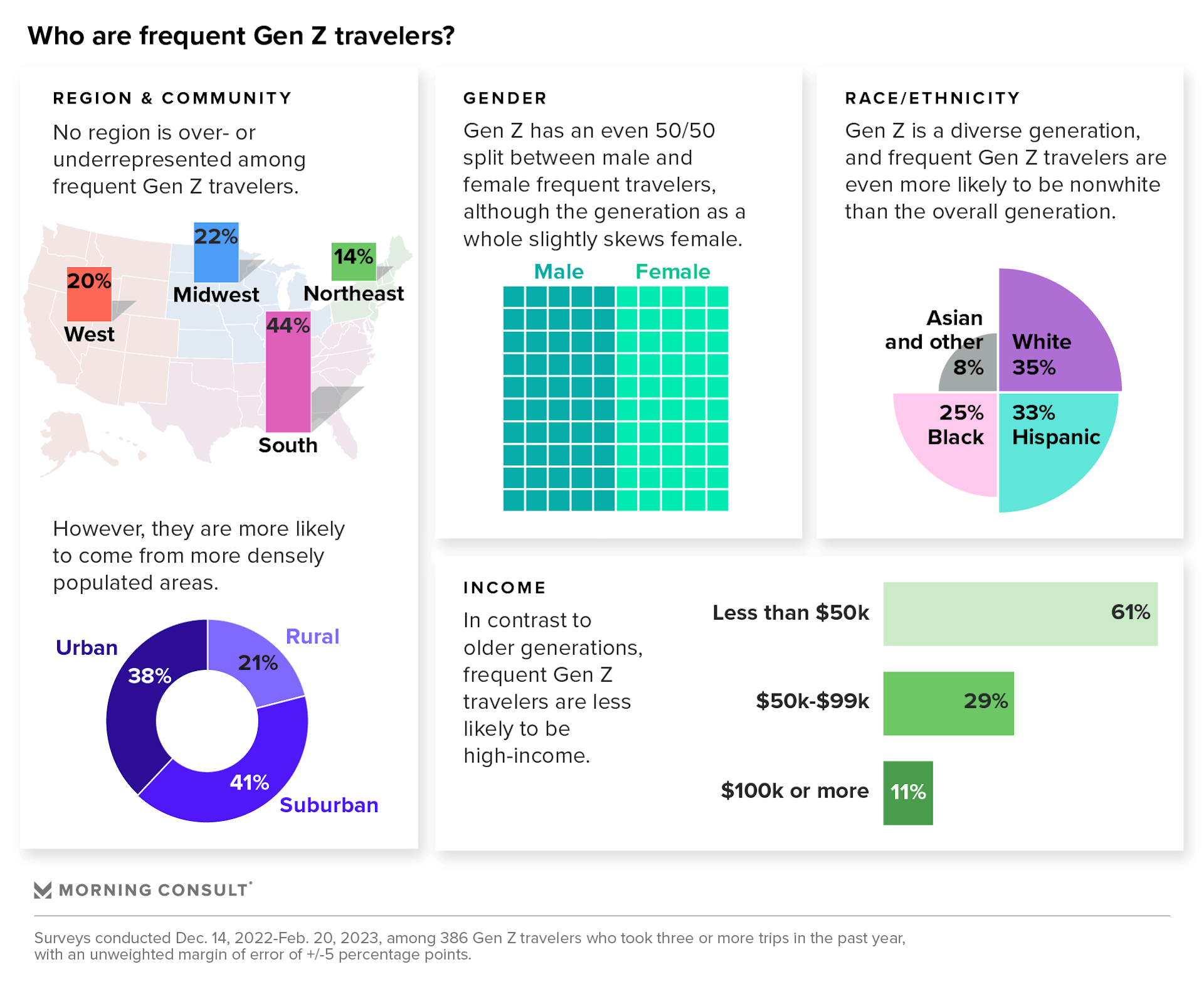Gen Z Is Poised to Reshape the Travel Industry

Key Takeaways
52% of Gen Z adults are already frequent travelers, on par with travel-happy millennials.
More traveling isn’t translating to more trust: Gen Zers have a lower level of trust in the industry than other generations.
Brands must focus on inclusivity and accessibility to build a strong foundation with Gen Zers as they solidify their travel habits and preferences.
For more insights on Gen Z, read our recent coverage on the generation, including their food & beverage preferences, their favorite celebrities and more.
Move over, millennials. Gen Zers — the generation born between 1997 and 2012 — are coming into their own when it comes to spending power, and many are choosing to spend on travel. While their initial entry into the category was hindered by the COVID-19 pandemic, the youngest generation of adults is making up for lost time by traveling enthusiastically and often. Travel brands must understand Gen Zers’ unique behaviors and expectations and lay the groundwork with them now to ensure future success.
More than half of Gen Zers are already frequent travelers
Despite their youth and comparatively low income, Gen Zers are traveling — and they’re doing so frequently. Just over half of Gen Z adults (52%) are frequent travelers, meaning they took at least three leisure trips in the past year. That share is significantly larger than it is for higher-earning Gen Xers and baby boomers, and it’s on par with millennials, who are currently the focus of the industry. As Gen Zers age and grow in spending power, they will likely outpace travel-happy millennials.
Despite being engaged travelers, Gen Zers expressed a lower level of trust in the travel industry than other generations. This is reflective of a truth about Gen Z as a whole — they tend to exhibit lower levels of trust in all industries and institutions. But that doesn’t mean travel brands should simply give up. To set a strong foundation with the travelers of tomorrow, brands should focus on building trust with Gen Zers today.
Frequent Gen Z travelers are lower-income, urban and diverse
As a traditionally expensive, discretionary category, leisure travel has long been an activity that is more accessible to higher-income consumers. Consequently, the most frequent leisure travelers tend to be the highest earners. For example, millennials in households with annual incomes of at least $100,000 are 5 percentage points more likely to be frequent travelers than the general population; that gap is even larger for Gen Xers and baby boomers, at 7 points.
For Gen Zers, that difference is only 1 point — in fact, 61% of Gen Zers who took three or more leisure trips in the past year come from households earning less than $50,000 annually. What this suggests is that the youngest generation isn’t waiting until they have a certain amount of income or savings to see the world; they’re finding ways to fit it into their budgets now.
The most frequent Gen Z travelers are also more racially diverse. While it’s true that this generation as a whole is more diverse than those that came before, travelers skew even more nonwhite. Frequent Gen Z leisure travelers are 3 points more likely to be Black compared with the generation as a whole, and casual travelers (those who take one to two leisure trips a year) are 8 points more likely to be Hispanic.
While there is no significant regional skew — frequent Gen Z travelers are most likely to live in the South, but only because that’s where the plurality of Gen Z adults live — frequent Gen Z travelers are more likely to hail from urban communities than the generation as a whole. Similar to millennials before them, Gen Z travelers are comfortable navigating city settings and using the tools that come along with them. Accordingly, this group of travelers will leverage mass transportation, the sharing economy and other services that allow for inexpensive, accessible travel.
Gen Zers favor longer trips to new destinations
Gen Z travelers aren’t just unique from a demographic perspective; they also exhibit different behaviors than prior generations. This is due in part to different travel motivators. While the rank order of frequent Gen Z travelers’ leisure travel motivators is similar to that of all frequent travelers, the top three — to relax, to get away and to spend time with loved ones — are less relevant for Gen Zers compared with frequent travelers in general. Instead, they are more motivated by every other factor, particularly experiencing adventure and improving mental health. To be sure, some of these differences are driven by the relative youth of these travelers, but the idea of going on a trip to better your mental health is one that is sure to stick with the generation as they age, given the growing prevalence of discussions about mental health in today’s culture.
This adventurous, open mindset manifests in Gen Z travelers’ behaviors. Frequent travelers in this generation were more likely to say they’re traveling internationally in the coming year than frequent travelers from other generations, and they’re the only group that was more likely to say they’ll visit a destination they’ve never been to before than to say they plan to revisit a familiar location.
This doesn’t mean they’re avoiding more structured trips, though: While 52% of frequent Gen Z travelers said they’ll go to a national park in the next year, 54% said they’ll go to a resort, and 55% plan to go to a theme park. No matter where they end up, they’re in it for the long haul — 15% of Gen Z travelers said their next leisure trip will last longer than two weeks, a higher share than any other generation.
This enthusiasm for the category, coupled with Gen Zers’ tendency to travel long distances for extended periods of time, means that the industry can no longer ignore this important group of consumers. Combined with demographic factors, these motivators shape Gen Z travelers’ attitudes and expectations — they expect travel to be accessible and inclusive to all people, not just the highest-earning, most privileged consumers.
To connect with this key audience, brands must craft products, services and messaging that reflect these expectations and facilitate travel opportunities for those who may have historically been excluded from the category. Millennials may be the industry’s current darlings, but brands that can successfully engage Gen Zers now will set themselves up for long-term success.
Lindsey Roeschke is an analyst whose work focuses on behavior and expectations of consumers in the travel & hospitality and food & beverage categories, particularly through a generational and cultural lens. Prior to joining Morning Consult, she served as a director of consumer and culture analysis at Gartner. In addition to her research and advisory background, Lindsey has more than a decade of experience in the advertising world. She has lived and worked in seven cities across four continents.
